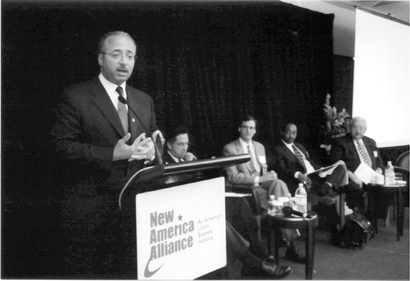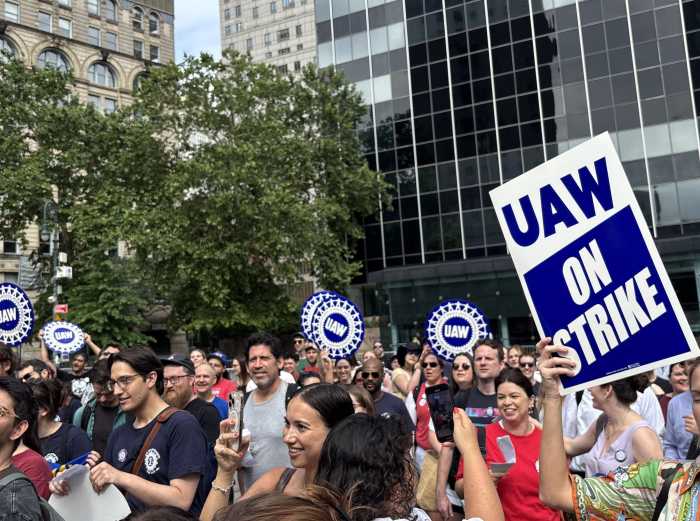Comptroller’s shareholder resolution prompts action on gender bias, domestic partnership
In a move laden with symbolism, Toys “R” Us, based in Wayne, New Jersey, has informed city Comptroller William Thompson that the company plans to bring its employment practices in line with the Equality Principles, a ten-point code of corporate conduct aimed at guaranteeing sexual orientation and gender identity equality in the workplace.
In January, Thompson announced that in his role as trustee of the city’s five pension funds he was filing a shareholder resolution against the company to try to bring its policies in line with the principles through a vote by the company’s stock owners. The Toys “R” Us resolution was one of 18 he initiated at that time, though only three aimed at adoption of all ten principles.
The move by Toys “R” Us had particular resonance because of a successful lawsuit waged by Manhattan civil rights attorney Thomas Shanahan on behalf of three transgendered women—Donna McGrath, Tanya Jinks and Tara Lopez—who were the victims of a 2000 attack at the toy company’s Bay Ridge, Brooklyn store, in which employees shouted homophobic slurs and brandished baseball bats. The women won their case, but in a stinging rebuke to the import of their claim, the jury awarded them only $1 in damages.
A subsequent ruling, upheld on appeal, resulted in the company having to pay nearly $200,000 in attorney’s fees, in a decision hailed as a vindication of the ability of plaintiffs to uphold gender expression discrimination claims in New York.
Still, to the end, Toys “R” Us maintained that it did not have liability for the attack. In the immediate aftermath of Thompson’s announcement in January, the company initiated formal action with the federal Securities and Exchange Commission (SEC) challenging the comptroller’s right to take the shareholder action, so the turn-around is particularly surprising.
“Toys ‘R’ Us has taken a significant step forward to value employees,” Thompson said, in a written statement. “This decision sends a message that corporate America must be a leader, and not a roadblock, in the path to equality.”
Thompson’s efforts with Toys “R” Us and two other corporations—Delta Airlines and Cerner Corporation, a Missouri-based leader in health industry information technology—represented a new departure in New York City’s efforts to change workplace policies regarding the lesbian, gay, bisexual and transgender (LGBT) community. Previous resolutions—which yielded success with corporations including Cracker Barrel, Winn-Dixie Stores, Marathon Oil, JCPenney, Lockheed Marin, FedEx and Goodyear Tire & Rubber—sought to ban employment discrimination based on sexual orientation. In pressing for the full Equality Principles, Thompson is aiming to end gender identity and expression discrimination as well and to ensure that LGBT couples have parity with married spouses in any domestic benefits offered to employees.
The ten principles were developed by the Equality Project, a non-profit, investor coalition formed a decade ago as the Wall Street Project to press for fair treatment of LGBT workers in American corporations.
Thompson’s decision to address the issue of benefits equality is a bold departure in shareholder activism, one that could have sweeping impact. The SEC exercises tight control over the types of issues that can be put to a shareholder vote, and typically excludes anything regarded as “ordinary business decisions” properly left in the hands of management. Provision of employee benefits, such as domestic partner health coverage, have typically been viewed as “ordinary business decisions,” so activists have shied away from pushing that issue.
However, according to Grant Lukenbill, an expert on LGBT workplace issues who is co-chair of the Equality Project, Thompson’s new efforts in this regard are not strictly an effort to influence the types of benefits employees receive, but rather a move to ensure that the nondiscrimination policies of corporations are properly enforced when distributing the benefits on which the company’s management decides.
“To put a spin on this as a domestic partner issue is not fair,” Lukenbill said in a telephone interview when Thompson announced his new initiative in January. “This is instead an effort to ensure that a company’s nondiscrimination policy is appropriately applied to financial benefits.”
Cerner Corporation also recently informed Thompson that it would comply with the Equality Principles, and according to Jeff Simmons, a spokesman for the comptroller, Delta has also held conversations with Thompson’s office, though the company has made no commitment.
The companies Thompson is currently targeting with sexual orientation nondiscrimination resolutions include Alcoa, Owens-Illinois, Harrah’s Entertainment of Las Vegas, U.S. Steel and ExxonMobil.
In moving toward the broader resolutions he filed against Toys “R” Us, Cerner and Delta, Thompson worked with the Equality Project and two New York City Democratic clubs—the Stonewall Democrats and the Gay and Lesbian Independent Democrats (GLID). Those groups are now hopeful that the effort to implement the Equality Principles can be accelerated.
“The battle seemed so lonely, and now we have the billions of the New York City pensions on our side and corporate America will take notice,” said Melissa Sklarz, GLID’s president and a longtime transgender activist. “If companies thought it was complicated two or three years ago, they now shrug and say there is a way to deal with this. We’ll bring back the old domino theory.”
“Nobody loses by supporting the Equality Principles,” Lukenbill said. “This is how we got companies out of South Africa.”
gaycitynews.com



































